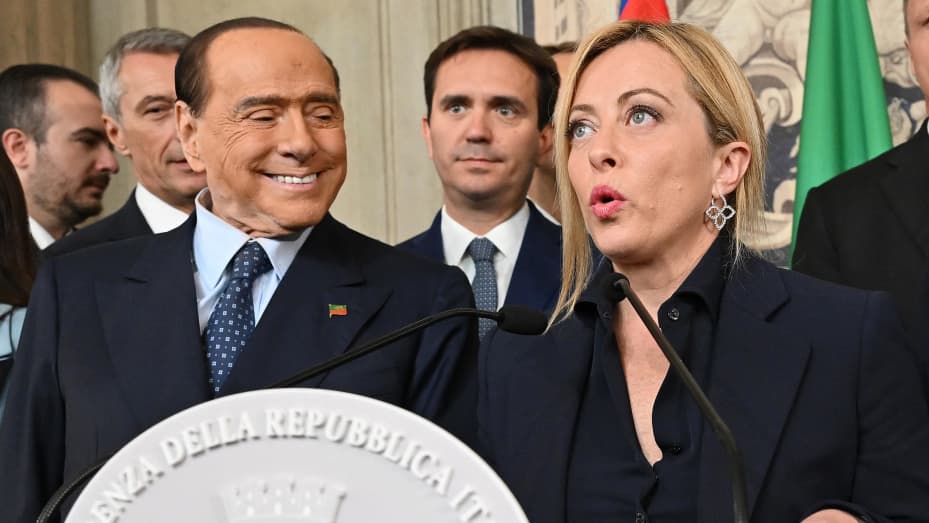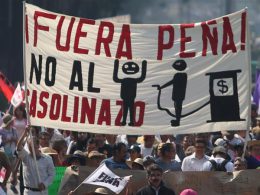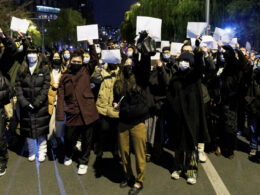By Eugenio Marcigliano & Fabian Colyn
The September general elections reaffirmed Italy’s deep political crisis. Yet another unstable coalition government, with all sorts of unelected technocrats as ministers, fell in July. With the lowest voter turnout since Mussolini still ruled, the right bloc emerged from the vote as the first parliamentary group and the far-right Fratelli d’Italia (FDI or “Brothers of Italy”) became the largest political party in parliament. Unfortunately, there was no credible left alternative in the election.
It was former prime minister Conte of the populist Movimento 5 Stelle (M5S or “Five Star Movement”) that pulled the plug on ‘Super Mario’ Draghi’s national unity government in July of 2022. This was in response to the government’s proposal for the ‘decreto aiuti’, an emergency relief bill, supposedly aimed at helping families and businesses after the pandemic in the face of the energy crisis and mounting inflation. Actually it represented just another fiscal reform with mainly tax credits for big business.
The Five star movement was bleeding support in the polls. It had not achieved anything for working class and poor people since the implementation of the so-called ‘Reddito di Cittadinanza’ (or ‘citizenship income’) in 2019, a highly conditional form of guaranteed minimum income, which has not even decelerated the general rise in poverty in the country. The pathetic last ditch attempt to save face didn’t save their seats in parliament.
With the absence of any credible left alternative in the elections, it was the far right bloc that managed to mobilise most of the frustration to the ballot box. However the outcome of the snap elections gives only a very distorted picture of the huge polarisation in Italian society. Enthusiasm for electoral politics in general has sunk to a historic low and among FDI voters a common explanation was: “We’ve tried all the others”.
On 21 October, Giorgia Meloni of the FDI became the country’s first female prime minister, with the most right-wing government since World War II. A host of reactionary figures took up posts as ministers and state secretaries. Eugenia Roccella, minister of the new Ministry of ‘Family, Birth and Equal Opportunity,’ has spoken out against abortion, LGBTQI+ rights and fertility treatments. FDI’s Galeazzo Bignami, photographed at his bachelor party in 2005 wearing a Nazi swastika armband, has been appointed undersecretary at the infrastructure ministry.
A repressive but unstable government
At the same time, Meloni presides over a weak and unstable government. The Ukraine war and accompanying rises in military spending are hugely unpopular in Italy. While Meloni rushed to guarantee Italy’s commitment to its role in NATO, the leaders of the junior partners in the government (Matteo Salvini of La Lega and Silvio Berlusconi of Forza Italia) are both well known Putin sympathisers. Competition and envy also run deep in the three party coalition. Meloni and her party have taken over Salvini’s voters and personal popularity. Berlusconi too feels humiliated as the mastermind and architect behind the far right electoral bloc, now forced to play second fiddle.
One of the new government’s first bills was the Rave Decree, which criminalises unauthorised musical gatherings of more than 50 people. While targeting illegal parties — a major political priority — this legislation represents a dangerous precedent for the further implementation of repressive policies in the country. Draconian prison sentences, censorship and police violence are being employed to scare workers and youth into obedience. In doing so they are deepening existing social tensions and fomenting the growth of violence in the streets and in the households, especially involving minors and young women. But the right is planning to further undermine social and civil rights, with migrants, women and LGBTQIA+ persons being the central targets.
This reflects the weakness of a government that, against the backdrop of a recession, is unable to adopt economic and social measures that alleviate the rising cost of living for an already impoverished Italian working class. The dramatic economic situation in the country imposes a straightjacket on bourgeois politics. Italian GDP has not yet recovered to pre-pandemic levels and is actually still far below what it was before the eurocrisis of 2008. 25.2% of the Italian population is at risk of social exclusion. 5.6 million people in Italy live in absolute poverty.
With a government debt level of 150% of GDP and a shaky banking sector, Italian economists breathed a sigh of relief last July when the European Central Bank launched the so-called ‘Transmission Protection Instrument’, a new bond-buying scheme designed to reduce the spread with German interest rates on government bonds. However the conditions for the bond buying are linked to so-called “sustainability of the debt”. It’s clear the Italian executive level has been told, also by the European Commission, that further rises in the government debt levels are impermissible.
Budgetary ‘orthodoxy’ and respect of the EU guidelines for “development of the European internal market” are an absolute necessity for the new government to secure the promised €200 billion in EU post-pandemic aid, as part of the ‘NextGenerationEU’ programme. The Meloni government’s economic policy is a continuation of the policy of the Draghi government with some far right accents like expanding the use of a low flat tax on income (15% on incomes below €85.000) and phasing out the ‘citizenship income’ by 2024.
By attacking migrants, women and other marginalised communities, this government hopes to divert attention from its own shortcomings and undermine working class solidarity. Certainly FDI’s position in power will boost the confidence of extreme right and neo-fascist groups. Already before the coming to power of Meloni there were frequent attacks on migrant workers, and accompanying FDI’s rise in the polls there have been more and more. In October 2021 there was an attack on the headquarters of the main TU federation — the CGIL — after a far right demo against lockdown measures and the so called ‘Green Pass’ (a measure that basically made Covid vaccination mandatory to go to work or even take the bus). In Predappio, Mussolini’s hometown, more than 4,000 ‘nostalgics’ gathered to celebrate the anniversary of the March on Rome, in late October 2022.
Struggle against the far right government
But young people and working people across Italy will not be left on the sidelines. On 27 September, thousands already took to the streets across Italy to show that they will defend the right to abortion against the far-right threat. This is part of a revival of the Italian feminist movement, which also protested gender-based violence in Rome on 26 November 26 and is preparing to flood the streets on 8 March.
There have already been several national mobilizations by social and workers’ organisations and collectives against the new government’s anti-social policies. Youth in particular are taking the lead, with occupations of schools and universities across the country. These culminated in a national day of action on 18 November, #NoMeloniDay, when 100,000 students and schoolchildren took action in more than 50 cities. They are demanding more resources for education and an end to brutal police repression of student protests.
Young people, however, are not alone in their struggle. The Unione Sindacale di Base and Si Cobas (independent trade unions) called for a general strike on 2 December under the slogan “down with the guns, up with the wages!”, followed by a national protest in Rome the next day for wage increases of 10%, a system of wage indexation and a minimum wage of €10 an hour. The CGIL, the largest trade union federation, called for a strike on 16 December, even if around more limited demands.
Meanwhile many local struggles are continuing, also oriented against the increasing repression. Weakness invites aggression and more attacks will come. The workers movement needs to assert itself! Examples of militant trade unionism such as the GKN workers in Florence, who formed a collective to defend the 500 jobs against factory closures and are actively building solidarity with other movements, are capable of rallying broad strata of society around them and laying the groundwork for an independent, militant labour movement that can take back control of the political terrain.
We need a united front of the trade unions, with workers, social and youth collectives, around a program of social and climate urgency as a basis for a broader movement that is capable of challenging the power of the right-wing and the interests of Confindustria and all capitalists:
- Abolish the Rave Decree, the Security Decrees and all other repressive laws aimed at strangling the working class;
- For the nationalisation of the energy sector and all key sectors of the economy, under workers control, to cap prices and use the enormous profits for green reconversion of production and massive investment in decently paid green jobs;
- For a massive public investment plan in essential services and for free public transport, education and health! For the abolition of Alternanza Scuola Lavoro, the Jobs Act and all policies that favour precariousness and exploitation;
- For a minimum wage of 10€/hour (1600€/month) and the reintroduction of wage indexation!
- Against increased military spending and imperialism in all fields. For a coordinated international working-class resistance to war and those who profit from it;
- For a democratic socialist society organised around the needs of the majority rather than the profits of a tiny minority!











